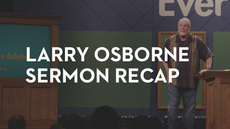“And we urge you, brothers, admonish the idle, encourage the fainthearted, help the weak, be patient with them all.” 1 Thessalonians 5:14
I’ve never liked absolute statements that include words like “always” and “never,” especially when those statements are directed at me. They always feel so condemning. Similarly, when reading the Bible, I struggle with the abundance of absolute statements that confront my desire for exceptions and allowances.
While I’m drawn to verses like 1 Thessalonians 5:14 that offer a spectrum of ways to respond to people based on where they are and how they’re struggling (as opposed to a one-size-fits-all approach), the notion of being patient with all people is difficult to reconcile.
I think to myself, “When Paul says ‘all,’ does he really mean all? Everyone? No exceptions? Even if I’ve tried really hard to no avail? What about someone who is really difficult?”
The reality is that when people are idle, fainthearted, or weak, we desire—and even sometimes demand—that the change happen quickly, largely because we’re sensitive to (if not selfish about) the impact walking with them will have on our time and energy.
Patience is costly. It requires something from us: a willingness to put another’s needs before ours.
We see this in the three parables Jesus tells in Luke 15. Notice, first, that the crowd gathered around him includes the disciples, Pharisees, tax collectors, and sinners. I imagine among them there were some who were idle, some fainthearted, and some weak (among other things).
In each parable the situation requires a slightly different approach. The shepherd lays the lost sheep on his shoulders because it’s likely weak and frightened, the woman lights a lamp and sweeps the house to find the lost coin, and the father willingly gives the prodigal son his inheritance prematurely, hoping he’ll return. All costly acts of love.
But the consistent theme in all of these stories is a patient pursuit of what was lost—searching, waiting, anticipating—and then once found, there’s rejoicing with friends, neighbors, and family.
So in this word to the Thessalonians, Paul isn’t simply sharing a do-good maxim that we’re to follow and feel guilty about when we fail; he’s reflecting the very nature of Jesus and his heart toward us—his willingness to patiently put our needs before his.
He does this because, as we see in Luke 15, Jesus knows the patient pursuit of people is worth the moment of rejoicing that comes when the lost are found, when the unrepentant come home, and when our brothers and sisters’ sorrows turn into joy.














